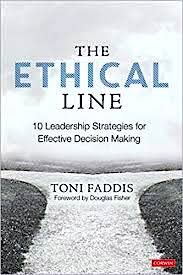Effective School Leaders Are Guided By Values
When I was a new principal, at the end of each day I could usually be found puzzling over that particular day’s dilemma. Looking back, I’m sure there wasn’t a true dilemma every single day – but at the time it sure seemed like it.
Besides being challenged by the people-centered situations that occur on every school campus, I also felt inundated – barely afloat in a tidal wave of tasks, meetings, and community members who all wanted to talk to me.
During my years as a teacher I controlled my schedule and had the ability to decompress after students left at the end of the day. When I became a principal, I quickly learned that “before school” and “after school” were not periods of time when I could complete the compliance-oriented functions of my job that always needed to be done. Those hours were filled with conversations with parents, staff members, and students and were frequently related to that day’s dilemma.
A big awakening
My first assignment as principal, when I was the actual “CEO” of a school, was a big awakening for me. I’m a pretty low-key person. I tend to keep my head down and get my work done. As a new principal I expected some disciplinary issues with students, but I wasn’t prepared for all of the drama that occurs between staff members and between parents, and sometimes between staff members and parents. Often that drama played out in my office, or even worse, in a public space in front of students.
One time there was a feud between two 5th grade girls and their families. There was an evening performance scheduled and the 5th grade teachers had ensured Sarah* and Kylie* were in separate scenes so their interactions would be minimized.
I watched the performance and thought the kids did great. However, I was naive to think that would be the end of it. The morning after the performance, Sarah and her mom, dad, grandma, grandpa, and uncle accosted me at 7 a.m. Kylie’s mom had sat near the front of the auditorium and “looked at” Sarah when she was on stage and what was I “going to do about it?”
This situation became an ethical dilemma when Sarah’s family demanded that Kylie be punished and Kylie’s family be banned from future school events. As much as I may have wanted to, I couldn’t say, “Seriously? Absolutely not. Get over it.” Instead, I employed what I’ve come to describe as principle-centered leadership.
Two anchors: Courage and well-being
My approach centers on my personal and professional belief system. Through all of the good times, the trying times, and the dilemmas, I’m anchored to my two core values: courage and well-being.
I’m very thoughtful about my values, and don’t just talk a values game, but I consciously try to live, and lead, through the principles I’ve established for myself. I’m aware that I see situations through my own lens, as a white female middle-class educator. So I’m conscious that my perspective is only one of many, and I rely upon my two core values to guide me.
My value of courage calls me to stand up and speak out for my beliefs. I own my mistakes. I engage in tough conversations knowing that I might not have the answers, but I want to learn. My value of well-being keeps me centered, grounded and in the right head space so I can help others to feel more calm and slow down their thinking and emotions.
I know my limits and don’t push myself over my edge. Articulating and living these values has helped me to create boundaries in my life and to make a lot of good decisions. I will quickly admit I’ve made mistakes, but we all do. It’s during those difficult times that our integrity and commitment to our values are tested.
Walking the ethical line
Many leaders talk about values at a surface level. When I first started thinking about the specific behaviors of school leaders, I imagined a line on the ground that divided ethical actions from unethical actions. I came to understand that each of us has our own ethical line. Our ethical line is our moral compass; it’s the north star, it’s the voice in our head that guides our thoughts and actions. That’s what led to the concept I present in my book The Ethical Line (Corwin, 2019).
The way I see it, as we go about our typical day all of us walk atop of our ethical lines. Stepping off the line for the right reason doesn’t make you an unethical person. Educators actually need to step off the line sometimes to make decisions that are in the best interest of students.
We need to step off because there isn’t always a rule or policy that applies to a particular situation or following the policy would actually be a disservice to the child in question. In one sense, we step off of our line when we choose not to adhere to a policy. On the other hand, we also are true to our ethical line if – when we do this – we are acting in the best interest of a child or group of children.
As our leadership skills develop, we become aware of the many situations that don’t have easy answers. The “right” or “ethical” answer isn’t always simple or apparent. Decision-making depends quite a lot on context and consequences.
Decision-making patterns in wealthy private schools will likely look different from the decisions educators make when we are serving in struggling communities. The needs and circumstances are different, so our considerations and priorities also need to be different.
When we change contexts or consider situations from a different point of view, we might find that our ethical line shifts slightly. To ensure that we continue to act ethically and in the best interests of our students, it’s critical that we continually practice self-reflection and check in with others to gain perspective and ensure we’re making decisions for the right reasons.
Our actions, both conscious and unconscious, are influenced by our values, habits, cultural orientations, and past experiences. These aspects of character also drive the ways in which we approach dilemmas, essentially establishing our own personal ethical line.
Given the wide range of issues and pressures that school leaders face, chances are we will make some mistakes along the way. We will make errors in judgement. We are not perfect, no one is. Nonetheless, it is our responsibility to maintain our ethical line, to lead by example, and to help others to work through issues when conflicts arise.
What it takes to be a leader today
Being an effective leader in today’s diverse school communities is not easy, nor is it simple. The field of education has changed drastically in the 21st century, making the work of educating students significantly more challenging. Education policies and standards have changed, teaching practices have changed, and the students we serve have changed.
To be the leaders our society needs us to be, instructional pedagogy and operational expertise are necessary but are not enough. It is through principle-centered leadership – adhering to core values, ensuring compassionate and skillful interactions, collaborating, and continually reflecting – that we will achieve our school missions.
As I reflect on my 14 years as a school leader, I think of a line from one of Emily Dickinson’s letters to a friend (1868): “The sailor cannot see the north, but knows the needle can.” Whenever I feel overcome in a sea of complex challenges and competing interests, I trust my moral compass to guide me.
When we are attentive about adhering to our ethical line, we can proceed with confidence and peace of mind. Pausing for self-reflection allows our core beliefs and values to shape our behavior and helps us achieve the principle-centered leadership our schools need so much.

Her first book, The Ethical Line: 10 Strategies for Effective Decision Making, is published by Corwin Press (2019) and includes a Foreword by Douglas Fisher. Her current writing project centers on trauma-responsive leadership in schools.
Toni’s second book, Collaborating Through Collective Efficacy Cycles: A Playbook for Ensuring All Students and Teachers Succeed (Corwin, 2022) is co-authored with Douglas Fisher and Nancy Frey.

































I will definitely order this book. As a principal, I found that my major ethical dilemmas occurred when my values were very different from top administrators.
I read The Ethical Line by Toni Faddis, and it is not only excellent but so relevant and on point with the realities and challenges of being the “CEO” of a school. The ideas and scenarios Toni shares in her book are very helpful. I definitely have peace of mind every time I adhere to my ethical line.
Relevant and in-depth insight on leadership.